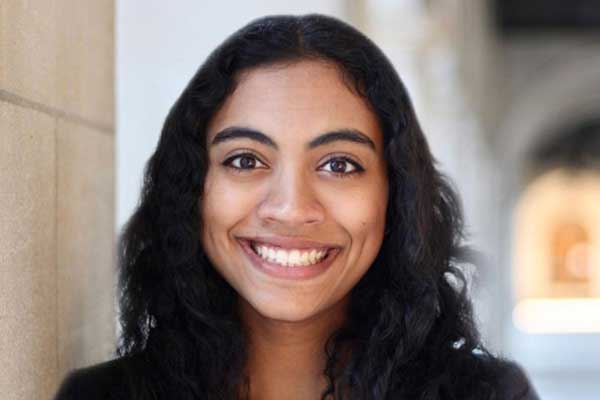Neha Damaraju
Biomedical Engineering
Degree pursuing: BS in biomedical engineering
Hometown: Herndon, Virginia

Why did you decide to attend WashU?
Coming out of high school, I knew that I was interested in both engineering and medicine but I couldn’t decide which one I felt more inclined to pursue. I came to WashU because the university offers strong academic programs and research opportunities in both of these fields and the intersection of these fields.
What was your favorite course and why?
My favorite course has been Bioelectric Phenomena taught by Dr. Dan Moran. In this class, we learned about bioelectricity, with a focus on neural and cardiac electrophysiology, and its applications. I really enjoyed this class because the material we covered spanned many different disciplines such as physiology, math, physics, history and more. Dr. Moran’s lectures were also extremely engaging and had many anecdotes and interesting facts.
Who is your favorite instructor and why?
This is a tough question because there are many instructors who I have appreciated for a variety of different reasons. Prof. Patricia Widder has been extremely supportive in helping guide BME students through their four years here at WashU. Prof. J. Tucker Krone and Prof. Seema Mukhi Dahlheimer are wonderful professors who care about their students not only as students, but also as human beings. Dr. Rohit Pappu helped me understand that a career in research can be challenging yet rewarding. Dr. Jon Silva and Dr. Jianmin Cui were extremely engaging when talking about their research and helped form a basis for what I think I’d like to study in graduate school.
What advice would you give to a new student?
Connect with your peers! Classes, especially engineering ones, can be tough. Having friends who are dealing with the same things helps alleviate stress and can make studying more fun. At the same time, don’t stress too much about finding "your people" immediately. I didn’t meet some of my best friends until the end of sophomore year. Just be open to meeting new people throughout your four years and learn as much as you can from each person!
What is your favorite thing about St. Louis?
Forest Park and Ted Drewes. Last summer, a perfect day would start at 6 a.m. with a five-mile run through Forest Park and end at 10 p.m. getting custard with friends at Ted Drewes.
What campus activities or groups would you recommend to a new student?
Relay for Life committee is a wonderful group of students who work hard to raise awareness and funds for the American Cancer Society. If you’re passionate about working towards a cancer-free world, I would recommend joining Relay for Life.
I am also a part of City Faces, where I mentor youth at local elementary schools, and Health Righters Magazine, an intercollegiate magazine that publishes work at the intersection of health and human rights. I would highly recommend joining both of these organizations.
Do you have any work history?
I have been a research assistant at the DiAntonio Lab at the Washington University School of Medicine since the beginning of my freshman year. My research explores the role of the newly discovered Toll-Interleukin-1 receptor domain family of NAD+ cleaving enzymes in bacterial immunity. I have also been a TA for Introduction to Computer Science, Engineering Math A and Engineers in the Community.
Are there any not-for-profit agencies that you have volunteered or worked with?
I co-founded ChalkBox, a non-profit that aimed to supplement virtual learning during the Covid-19 pandemic. We sent out boxes of materials to middle school students across the nation during the pandemic and mentored them virtually. I also worked through the organizations Jivita and National Center for Women in Technology (NCWIT) to put on STEM workshops in efforts to create equal education opportunities for all students. I worked with Just Moms STL to create historical maps to aid the EPA with the cleanup of radioactive waste in the Westlake Landfill. I am also a volunteer at Cardinal Glennon Children’s Hospital.
What are your plans for the future?
After graduation, I hope to pursue a joint MD/PhD degree with graduate study in biomedical engineering. I am interested in conducting research that takes a quantitative approach to analyzing biological systems. I aspire to one day be a physician-scientist, conducting research and seeing patients, while teaching at the university level.
